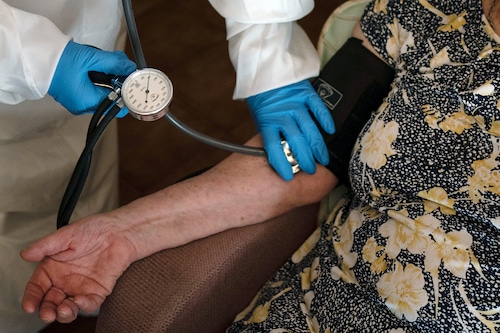Written by The Associated Press’s Lauran Neergaard
Washington By 2060, the number of Americans who will suffer from dementia is predicted to quadruple to almost a million every year, according to a study released on Monday.
This estimate is based on a recent study that revealed a higher lifetime risk than previously believed: if a person lives long enough after the age of 55, they have a 4 in 10 probability of eventually acquiring dementia.
Although it’s a frightening statistic, there are things people can do to lower that risk, such managing high blood pressure and other brain-damaging conditions. Even in middle age, there is still time to try.
Dr. Josef Coresh of NYU Langone Health, who coauthored the study published in the journal Nature Medicine, stated, “All of our research suggests what you do in midlife really matters.”
Dementia isn t only Alzheimer s
As you get older, it’s normal to have trouble remembering things like names or where you left your keys. However, dementia is a progressive loss of memory, language, and other cognitive abilities and is not a typical aspect of aging. The greatest risk is just growing older, and the population is aging quickly.
The most prevalent type, Alzheimer’s, can start two decades before symptoms show up due to subtle changes in the brain that eventually cause the disease. Other forms include vascular dementia, which occurs when the brain’s blood supply is compromised by heart disease or minor strokes. Vascular issues may worsen developing Alzheimer’s symptoms because many patients have a combination of reasons.
Medical research and public health recommendations can be guided by measuring the risk from a given age across the possible remaining life span.
Dr. James Galvin, an expert in Alzheimer’s disease at the University of Miami, warned that it is not a certainty that someone will get dementia. Although he was not a part of the new study, he stated that the results were consistent with previous studies.
Dementia risk is different by age
According to earlier research, roughly 14% of men and 23% of women will experience dementia at some point in their lives. More current data from a U.S. research that has monitored the heart health and cognitive function of over 15,000 senior citizens for several decades was examined by Coresh’s team.
Crucially, they discovered that the risk varies throughout the years.
Between the ages of 55 and 75, Coresh refers to as a critical 20-year window for preserving brain health, only 4% of participants experienced dementia.
The chance of dementia increased to 20% by the age of 85 and 42% between the ages of 85 and 95 for those who survived frequent health hazards until the age of 75.
The researchers found that the lifetime risk of dementia after age 55 was 48% for women and 35% for males. According to Coresh, one of the primary causes of the disparity is that women typically outlive males. The risk was slightly higher for Black Americans (44%), compared to 41% for white Americans.
Yes, there are ways to help lower dementia risk
Age and whether you have inherited a gene mutation called APOE4, which increases the risk of late-life Alzheimer’s, are two risk factors that people cannot control.
However, there are steps people may take to prevent or at least postpone health issues that lead to dementia in the future. For instance, Coresh wears a helmet when riding a bike because severe or recurrent brain injuries from falls or collisions raise the risk of dementia in later life.
FILE: On August 14, 2018, a physician examines PET brain scans at Banner Alzheimer’s Institute in Phoenix. (Photo courtesy of Matt York, File)AP
Importantly, Miami’s Galvin continued, “What’s good for your heart is good for your brain.” He exhorts individuals to control their blood pressure, diabetes, and cholesterol, avoid obesity, and exercise.
High blood pressure, for instance, can affect blood flow to the brain, which increases the risk of vascular dementia and is also associated with some characteristics of Alzheimer’s. Similarly, cognitive impairment and brain damage from inflammation are associated with high blood sugar in poorly managed diabetes.
Galvin advised maintaining an active social and mental life. If hearing loss develops with age, he advises patients to try wearing hearing aids, as this might lead to social isolation.
“I think it would be really, really important to build a better brain as we age,” he remarked, referring to the elements that we can control.
The Robert Wood Johnson Foundation and the Science and Educational Media Group of the Howard Hughes Medical Institute provide support to the Associated Press Health and Science Department. All content is entirely the AP’s responsibility.

